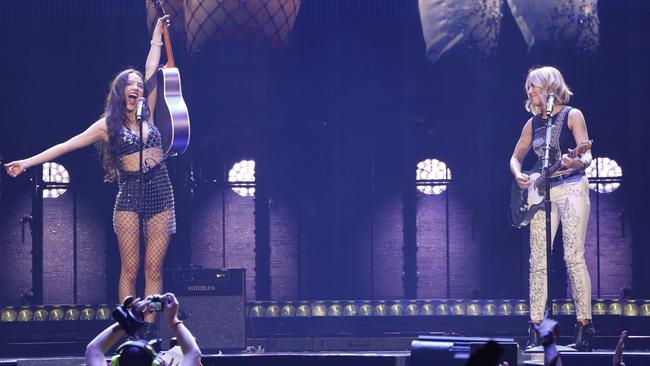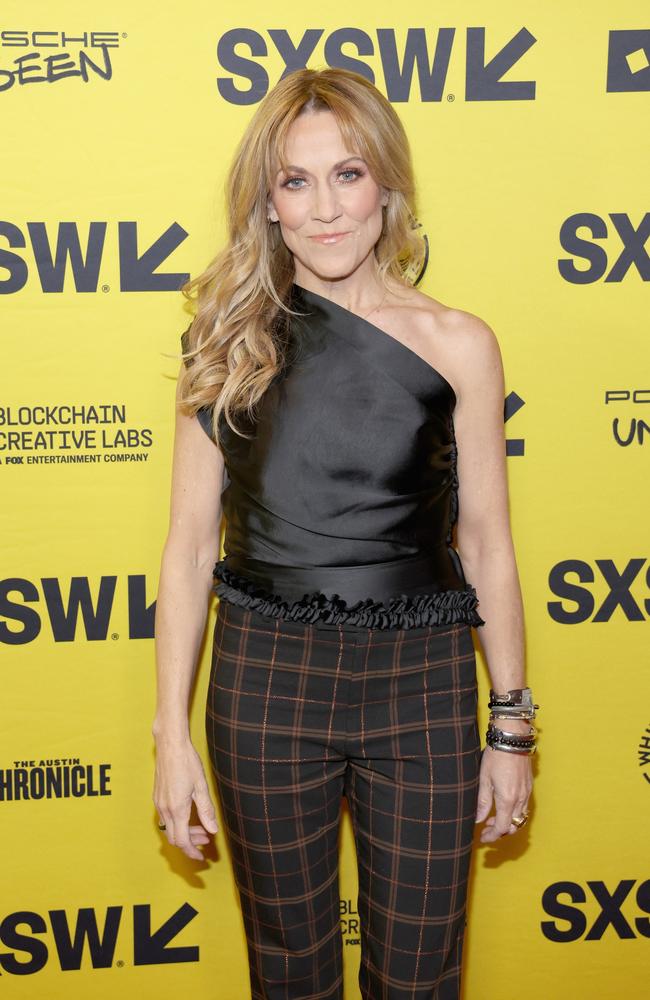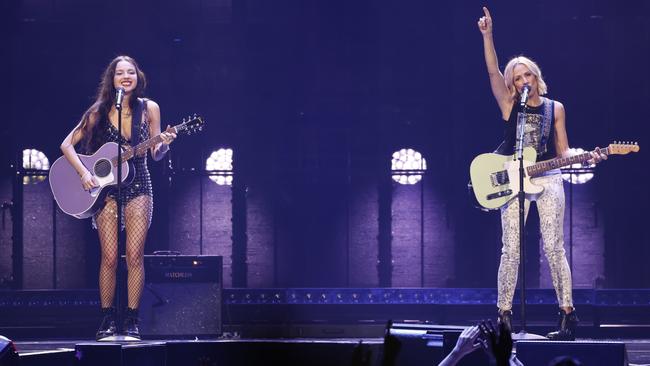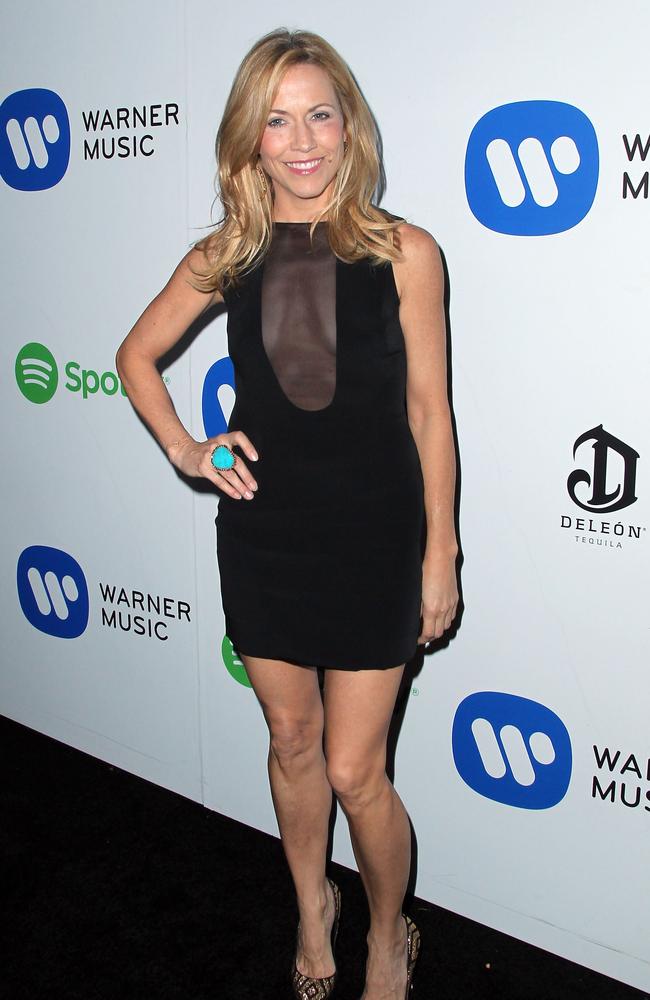Sheryl Crow on Britney Spears, scandals and ‘ageing out’ of the pop charts: ‘It doesn’t feel good’
Sheryl Crow reflects on how she felt competing with ‘sexualised’ singers Britney Spears and Christina Aguilera at the height of her career, telling Stellar she didn’t ‘know how to stay valid’.

Stellar
Don't miss out on the headlines from Stellar. Followed categories will be added to My News.
Sheryl Crow reflects on how she felt competing with ‘sexualised’ singers Britney Spears and Christina Aguilera at the height of her career, telling Stellar she didn’t “know how to stay valid”.
You were inducted into the Rock & Roll Hall of Fame late last year. Do you remember much of the night, or is it all a blur?
I really thought it would be like having a wedding, right? You plan the whole thing and then you come home and can’t remember any of it. There were a lot of machinations into getting people there, who was going to sit where … [so] it was a little bit like planning a wedding reception. But my evening settled in to a more peaceful place once I got onstage and got to play with Stevie [Nicks] and Olivia [Rodrigo] and Peter Frampton, and thank the people who have been there since the beginning. Everyone has been there since the early ’90s, so
it really was a celebration. And to have my children there [teenaged sons Wyatt and Levi] who, for the most part, haven’t understood the scope of what was before them. Which is what kids do; they don’t think about who their parents were before they came along. They got to understand the weight of it. It was pretty amazing.


Did being inducted matter to you? One of your musical heroes, Linda Ronstadt, famously said “I don’t care if I ever get inducted” just before she got voted in.
I’ll be honest: before I was listed among the nominees, I had felt it was pretty political. There were a few people on the board who decided who could get in; it was based on their snobbery. It wasn’t something I was aiming or politicking for. So there was a moment where I felt like, OK, this feels nice to be noticed, but do I like the feeling of maybe having my name come up and then not get in? For an artist who’s already overly sensitive, there’s a weird experience that goes along with being nominated for anything. I had to be more philosophical about it. There are people at the Rock Hall who are fully responsible for why I am who I am; Stevie Nicks is one of them. So it is an honour. I have had a long and illustrious career that I am proud of.
What did you make of Rolling Stone co-founder Jann Wenner’s sexist and racist comments that were published in The New York Times in September, and got him booted from the Rock Hall board of directors? He was a champion of yours from the start. Were they disappointing?
They were and they weren’t. They did disappoint me. My mouth is still agape over some of the comments. I don’t know where he was coming from with that. All I can say is that I fully disagree with what he said.
The 2022 documentary Sheryl covers off some of the sexual harassment you faced early in your career, when you were a back-up singer in the late ’80s and early ’90s, notably the experience you had with Michael Jackson’s manager. There is now a wholescale reassessment of the way women – across not just the music industry but all industries – were spoken about and treated for decades. What’s your take on all of this?
When I was coming up, there was no self-branding. We didn’t have social media. The business at large was run by men. I only knew one woman who was an engineer, one woman who was in the upper echelons of a label. I knew no female managers, no female agents, no female radio programmers. What happened to me happened frequently. With #MeToo, women are taken more seriously. What’s interesting is that when you get women who are bigger than the actual system in general – like a Madonna or a Beyoncé or a Taylor – it sort of is a giant “eff you” to the entire history of men manipulating women.
But I also look at it and think that, where I would never have wanted to be sexualised, women are sexualising themselves. And is it in the name of feminism or is it in the name of branding? Is this good or is this bad? I’m raising two boys, and some of what I have to explain to my kids about what goes along with being a female artist now doesn’t necessarily, to me, ring true with strength or feminism. But who am I to say?

Evolution is your first studio album in four years, and you sound relaxed and carefree on the tracks. Is that a fair assessment?
I would say this record is wholly more introspective. It started with the song ‘Evolution’, which is a deep dive into what the future is gonna look like with AI, and what it means with my kids. It’s interesting being a songwriter, raising two future adults, being able to look at my life
in comparison to what they are not only experiencing now but also what they are inheriting …
That has made this record really contemplative. Even though the album is fun, there are
a lot of letters to my kids and also myself about how you need to be present.
Speaking of this album, you said something in a recent interview about the liberation of being a legacy artist who isn’t necessarily chasing Top 10 hits. But is there a part of you that still yearns to be a success on the charts regardless?
It’s so different now. I turned 40 when Britney Spears and Christina Aguilera were all over the charts and being – not necessarily advertised – but styled to look sexualised, right? I went through a period of: I don’t know how to stay valid; I don’t know how to stay current, or even relevant, at 40 when everything is going to a 17-year-old audience. So I’ve been through that. Certainly at that moment, I was grappling with staying pertinent, keeping my sound and hopefully staying on radio, but also wanting to write the stories that mattered to my age [Crow is now 62].
It is liberating when you age out, but it doesn’t feel good to be put out to pasture. It’s weird. It’s also weird to have come up in an age where people bought albums, and made memories to a full album.
And we felt how many people owned our records by virtue of the fact we knew how many people bought them. Now we don’t know who is listening to our music. You wind up on playlists with people like Ice Spice, and you’re like, whaaat?! It does feel like you don’t know who, if anyone, is hearing your music. And even if you wrote the greatest song ever, because of your age, it’s not going to get played. That is a crappy feeling. But I choose to embrace the liberating part of it, and keep writing about things I care about, because I know there is a huge swathe of the population walking through life like me, going, what the eff is happening? So I’m not going to write songs for 17-year-olds, and I just have to live with not being popular.
Evolution is out on Friday. Read the full interview with Sheryl Crow in Stellar. And listen to the latest episode of Something To Talk About below:


